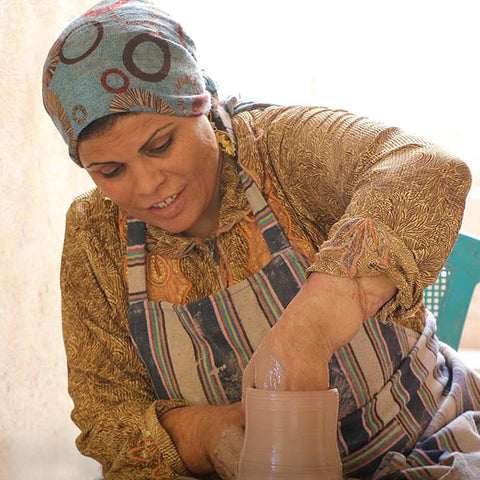Tunis village in the Fayoum governorate of Upper Egypt – a seemingly quiet and inconsequential community established on the banks of the saltwater Qarun Lake. Here in this oasis, where desert sands meet the lapping waters of Qarun, children can be found playing in the mud on the banks, fashioning small toys and vessels from this naturally occurring clay.

It was in this very spot that renowned, Swiss-born potter Evelyne Porret first met a young girl named Rawiya. Rawiya enjoyed playing at creating things with mud but had never dreamed that it could become her life’s work. Coming from a difficult home life and living in a traditional culture where women were expected to marry young and have a family rather than a career, the outlook for Rawiya’s life looked set at the age of 12.

Somehow though, Rawiya always felt that she would do something different, that she would buck the trend of what had always been expected and create something that she was uniquely destined for.
Evelyne had made her home in Fayoum with a vision to nurture the natural creativity she observed in the children of Tunis village and help them to shape a brighter future just as a potter shapes a lump of clay into a beautiful ceramic. She established a Pottery School & Workshop and Rawiya arrived as the first student, eager to attend and learn the art of pottery.

Rawiya faced much judgement and condemnation from her community for her decision to pursue an education and a career rather than marriage. Many people believed that a woman with a job would never be able to marry and that what Rawiya was choosing to do with her life was sinful.
Despite all this opposition, Rawiya remained steadfast in her passion for pottery and her pursuit of a better life. Grinning with pride she told us,
‘When I was a teenager the artist who taught me this amazing craft invited me to travel with her to Europe to show my products in an exhibition. No girl from our village had ever travelled before, and I had to fight for permission, but it was the most amazing experience that I have ever had.’

Now in her 40s, Rawiya is an accomplished artisan who is revered both locally and internationally as a pioneer – the first woman in Tunis village to ever have a career and now the first of many to become a master potter. She has continued Evelyne’s legacy and now has her own workshop where she is currently training 47 women and 3 men in the art of pottery and just in case anyone was wondering whether there was any merit to the concern verbalised by her community in her youth, Rawiya jubilantly reports,
‘Since I have had success making and selling pottery, young girls and their fathers in the village have seen how beneficial it is to have a career – I have started a revolution! Before opening my workshop, I had to practice teaching to make sure I could train others in pottery – so I taught my two brothers…and my husband!’
She says with a confident wink.
‘My husband always supports me in my work – that is the most amazing thing.’

Rawiya certainly never has time to get bored! In addition to running all her training courses in the workshop and mentoring young artisans, she continues to handmake all her own ceramic pieces which are sold in several shops in Tunis and Cairo and she has also begun working with Fair Trade Egypt which has opened up an international market for her products. Rawiya estimated that, on average, 10 plates would take about a week to complete but the craft is so absorbing that you hardly notice the time that each piece takes to create, and it is such a joy to see each finished work of art that you have created and even more amazing to watch others enjoy the pieces they buy.
Rawiya is proud to have been able to ship her ceramics to the UK to feature in our Embrace range and we are very proud to be hosting such magnificent and meaningful craftsmanship.




